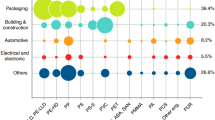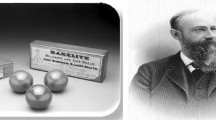Abstract
Development of a simple process for separating cellulose and polyester from their mixed fabrics is indispensable for the recycling of waste mixed fabrics. The authors have developed an efficient two-step procedure that consists of an acid treatment and successive mechanical treatment of the mixed fabrics, or more specifically a 1-min static acid treatment of the mixed fabrics with 95 °C aqueous 10 N H2SO4 and successive mechanical beating in room-temperature water. The procedure was also found to be effective for the separation of regenerated cellulosic fabrics from their mixed fabrics with polyester. Cellulose was efficiently removed from polyester fabrics as a powder, with high recovery of both cellulose powder and polyester cloth.








Similar content being viewed by others
References
Brossard LD, Lasalle VPG (1994) Production of terephthalate esters by degradative transesterification of scrap or virgin terephthalate polyesters. US Pat 5319128
Browning BL (1967) Methods of wood chemistry, vol. II. Interscience, New York, p 537
Everhart WD, Makar KM, Rudolph RG (1998) Recovery of polyester from contaminated polyester waste. PCT WO98/47952
Everhart WD, Makar KM, Rudolph RG (1999) Recovery of polyester from contaminated polyester waste. US Pat 5866622
Freytag R, Donzé JJ (1983) Alkali treatment of cellulose fibers. In: Lewin M, Sello SB (eds) Handbook of fiber science and technology, vol. I: chemical processing of fibers and fabrics, fundamentals and preparation, part A. Marcel Dekker, New York Chapt. 3
Gruntfest I, Turner R (1976) Treatment of textile waste formed of polyester and cellulosic fibers. US Pat 3937675
Gruntfest I, Turner R, Rebenfeld L (1976) Method of recovering constituents from polyester and cellulosic textile waste. US Pat 3937671
Langley KD, Kim YK, Lewis AF (2000) Recycling and reuse of mixed-fiber fabric remnants. Technical report #17, Chelsea center for recycling and economic development, University of Massachusetts
Lauriol JM, Comtat J, Froment P, Pla F, Robert A (1987) Molecular weight distribution of cellulose by on-line size exclusion chromatography—low angle laser light scattering. Part. II. Acid and enzymatic hydrolysis. Holzforschung 41:165–169
Mays AT (1974) Methods of recovering waste cellulosic fibers. US Pat 3801273
Negulescu II, Kwon H, Collier BJ, Collier JR, Pendse A (1998) Recycling cotton from cotton/polyester fabrics. Text Chem Color 30:31–35
Nevell TP, Upton WR (1976) The hydrolysis of cotton cellulose by hydrochloric acid in benzene. Carbohyd Res 49:163–174
Serad SL (1994) Polyester dissolution for polyester/cotton blend recycle. US Pat 5342854
Sidebotham NC, Shoemaker PD, Young III CW (1977) Fabric dye stripping, separation and recovery of polyester. US Pat 4003880
Vasconcelos A, Cavaco-Paulo A (2006) Enzymatic removal of cellulose from cotton/polyester fabric blends. Cellulose 13:611–618
Acknowledgments
We thank the Ministry of Economy, Trade and Industry, Japan for financial support, and Ms. Yoshimi Morita for technical assistance.
Author information
Authors and Affiliations
Corresponding author
Rights and permissions
About this article
Cite this article
Ouchi, A., Toida, T., Kumaresan, S. et al. A new methodology to recycle polyester from fabric blends with cellulose. Cellulose 17, 215–222 (2010). https://doi.org/10.1007/s10570-009-9358-1
Received:
Accepted:
Published:
Issue Date:
DOI: https://doi.org/10.1007/s10570-009-9358-1




